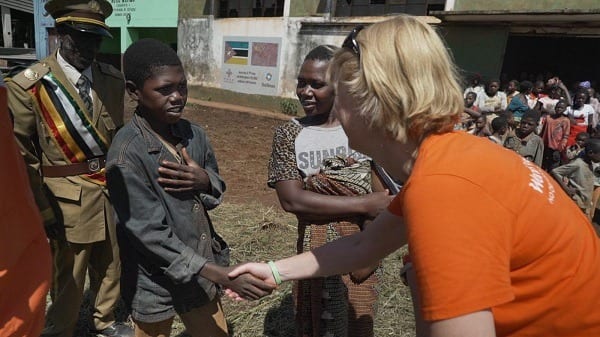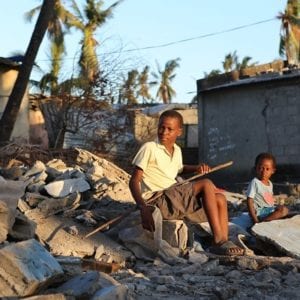That’s two ‘once in a lifetime’ storms inside six weeks!
Humanitarian workers are at the ground zero of catastrophic weather events. From cyclones to flash floods and even prolonged drought – we see it all.
The environments we work in are rapidly changing, with more severe floods, droughts and natural disasters. The consequences are deadly in the communities we help.
You can argue the toss over any single climate event but the trend shows that we are in climate strife. We could be heading into Code Red territory – and this means here in Australia too.
Driving through the Mozambican city of Beira after the unprecedented violence of Cyclone Idai was like witnessing a recent apocalypse. Trees were uprooted. Houses and telephone poles were skittled. This disaster impacted more than a million, killed about 1000 people across Mozambique, Malawi and Zimbabwe, displaced 70,000 and left communities battling outbreaks of cholera and malaria. It was described by the United Nations as one of the Southern Hemisphere’s worst ever storms.
Aid agencies are still counting the damage from last Friday’s Cyclone Kenneth, which OCHA says was the strongest cyclone to ever hit Africa. The United Nations has described the back-to-back storms as “unprecedented.”
On the other end of the scale, we are seeing prolonged drought like never before in places like western Afghanistan. Local communities have watched helplessly as their sole income – cattle – starved due to failed crops and dehydration, followed by unseasonal, intense flash floods that wiped out farms and whatever was left.
Climate change threatens to make entire cities or rural areas uninhabitable. A 2018 World Bank study projects tens of millions of people will be forced to leave their homes by 2050. Rising sea levels are already forcing low-lying Pacific Island communities to be re-located to higher ground. Where will these people end up?
Responding to disasters, and helping mitigate against them, has always been part our job. But how we protect vulnerable communities from ever more intense, prolonged and unpredictable weather events is becoming an increasingly urgent conversation among humanitarians.
My personal frustration is that while have tremendous know-how and solutions, we’re thwarted by the lack of political and social will to roll them out at scale.
Climate change is a global problem. It can and does displace people from their homes, towns and countries. This election, we need to see leaders from every party signalling that they are willing to get serious on this issue. We’ve dithered for decades – enough is enough.
We know that when there’s political will, NGOs and governments can achieve incredible things together.
Huge strides have been made in terms of halving infant mortality in last 20 years. Since 1990, 2.6 billion people have gained access to clean drinking water, thanks to NGOs and major donors like governments.
In 24 countries where we are actively working to regenerate forests we’ve seen that it improves food security, restores the land, and improves micro-climates.
Regenerating forests not only combats climate change but has positive flow-on effects for poverty, malnutrition, conflict and the escalating refugee crisis. Our program, known as FMNR is so successful, that even the World Future Council recognised it as one of the most effective measures to strengthen capacity for adaptation to climate change.
But global achievements like this could be wiped out with water availability predicted to decrease sharply in the dry tropics and sub-tropics, affecting about 2 billion people worldwide, according to climate expert David Spratt.
Climate change is not going to go away. There is nothing in the history books that teaches us how to respond to climate change. We are in uncharted territory.
This is why we need real leadership. We owe it to the next generation.
As sixteen-year-old Swedish climate activist Greta Thunberg said recently:
“I don’t want your hope… I want you to panic … I want you to act as if the house is on fire because it is.”
Words of warning we can’t afford to ignore.




